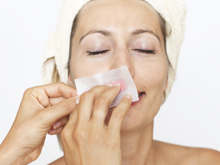Health Topics
-
Healthy Living
-
|
|
September 2011
|
| Facial Hair – Not a Pretty Sight! |
| Dr.Tirthankar Choudhury |
| |
 |
A pretty face is every woman’s dream. But a hairy face, pretty or not, can be a nightmare. Having a small amount of facial hair is normal in most women. |
However, enormous hair growth can occur in women suffering from the below mentioned medical conditions:
- Hirsutism – This is characterized by excessive coarse, dark hair growth on the face, chest, abdomen and back. Other symptoms include decreased breast size, irregular menstruation,a deepening of voice and other male-pattern hair growth throughout the body. It happens because of an increased secretion of androgens in women.
- Polycystic Ovary Syndrome – In this, cysts on the ovaries cause excessive facial hair. Such women also suffer from high levels of androgens and irregular menstruation, acne, weight gain, high cholesterol, high blood pressure and infertility.
- Cushing's Syndrome – This is caused by an overdose of cortisol in the bloodstream, which leads to excessive facial hair. Other symptoms include headaches, bruising, weight gain and fatigue. This condition may also occur because of a tumour in the body, or as a side effect of corticosteroid medications.
- Obesity - Women who are overweight may also exhibit an increase in facial hair because fat traps androgens, which in turn creates hormonal imbalances.
- Menopause and Perimenopause – Hormonal imbalances during such periods can also increase facial hair. Hot flashes are also experienced due to a loss of estrogen,and an increase in testosterone. Some women also experience depression, irregular periods, mood swings and night sweats.
Treating excessive facial hair through
- Anti-androgen prescription – Your doctor may ask you to take medicines such as spironolactone and finasteride to block excessive male hormones being produced in your body.
- Birth control pill prescription – Your doctor may also ask you to avail of these to decrease androgens in the body. Alternately, he may prescribe birth control pills in combination with anti-androgen medicines.
- Eflornithine – Your doctor is likely to ask you to apply this prescription cream, specifically designed to slow down the growth of facial hair, on the affected skin on your face and chin. Results are often seen within 4 to 8 weeks after commencing treatment. Side effects include skin irritation and stinging, as well as rashes.
- Combo - Women who have polycystic ovary syndrome are usually treated through a combination of birth control pills, anti-androgen hormones and surgery.
|
Home Remedies
- Apply a paste of gram flour, turmeric and water or curd to the affected area and let it dry. Gently rub off when it dries.
- Rub affected area with a pumice stone after applying soap during your bath every day. Hair growth will eventually decrease because the stone will have ruptured the follicles over time.
- Mix lemon juice, honey and sugar. Microwave the mixture for two to three minutes till it achieves a smooth consistency. Spread the mixture thinly and evenly over the affected region, press a fabric over it, and pull in the opposite direction.
- In case of hair ingrowths, wash the affected area with an antibacterial Panoxyl soap bar for best results.
|
Hair Removal Options
Electrolysis removes hair permanently by delivering a small electrical current through a needle placed into the hair follicle.
- Laser hair removal works best on women with darker facial hair. This process requires periodic treatments for complete hair removal.
- Over-the-counter waxes and creams are easy ways to get rid of facial hair. Both methods might irritate the skin. Creams are applied to the area and then removed after a period of time. To wax the area, put hot wax onto the hair and, after cooling, peel it off.
- Tweezing is the most popular and inexpensive way to manage facial hair. There are numerous types of battery powered tweezers and similar hair removal devices in the market. This method works best for minimal facial hair.
- Shaving facial hair is not recommended. It will appear to grow back thicker and darker.
|
Dr.Tirthankar Choudhury is senior Consultant Diabetes and Endocrinology Apollo Hospitals Kolkatta.
|
|
|